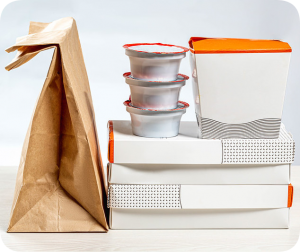 Before the coronavirus pandemic, takeout and delivery orders made up just a small portion of total sales for most restaurants. With countless customers now homebound, though, to-go business has never been more important for eateries across the country. Many restaurants use apps like Grubhub, Seamless, or DoorDash to handle delivery orders, but these services come with quite a few problems for all their convenience. Besides signing up companies that don’t offer delivery, food startups have also deceived restaurants and customers in several bizarre ways.
Before the coronavirus pandemic, takeout and delivery orders made up just a small portion of total sales for most restaurants. With countless customers now homebound, though, to-go business has never been more important for eateries across the country. Many restaurants use apps like Grubhub, Seamless, or DoorDash to handle delivery orders, but these services come with quite a few problems for all their convenience. Besides signing up companies that don’t offer delivery, food startups have also deceived restaurants and customers in several bizarre ways.
For instance, a few weeks ago users across the Internet shared stories about ordering pizza from a place called Pasqually’s that they thought was locally owned. When their food arrived, however, perceptive eaters realized that the pizza was actually from Chuck E. Cheese. It turned out that “Pasqually” was not an enterprising local restaurateur but instead the Italian chef from the pizza chain’s animatronic band. The company had rebranded its food for delivery using a “ghost kitchen,” or an eatery that exists only for online delivery orders. “This new brand is the latest example of CEC Entertainment creatively adjusting to meet the needs of consumers in a unique way, allowing for more variety and convenient options available for delivery,” said the company in a statement.
Along with listing national chains posing as local establishments, food startups like Grubhub can also fool customers into calling dummy phone numbers. The company automatically generates unique phone numbers for all the restaurants it lists, some of which can appear high in the results of Google searches. Customers who unsuspectingly click on these numbers are then redirected to the restaurant while Grubhub collects a phone order fee. “If a customer calls to place a coffee order, we’re paying a $6.42 fee — for a coffee,” said Rafaela Negrao, co-owner of Gourmet Kitchen in Brooklyn. “You are paying for someone to drink your coffee. If you look at it that way, you see how much it hurts.” What’s more, startups like DoorDash and Grubhub can’t even manage to earn profits despite drawing money from increasingly shady sources. As a result, many small business owners and regional legislators are working to limit the power of these venture capital-backed services.
Questions:
- Do you think it is ethical for companies like Chuck E. Cheese to use ghost kitchens on food delivery apps? Why or why not?
- Do you think restaurants should continue to depend on delivery apps like DoorDash or Grubhub? Why or why not?
Source: Jelisa Castrodale, “Trying to Support a Local Pizza Joint? Just Make Sure It Isn’t Actually Chuck E. Cheese,” Food & Wine, April 24, 2020; Venessa Wong, “Even If You’re Trying To Avoid Grubhub By Calling Your Favorite Restaurant Directly, Grubhub Could Still Be Charging It A Fee,” BuzzFeed News, May 15, 2020. Photo by Marco Verch.
